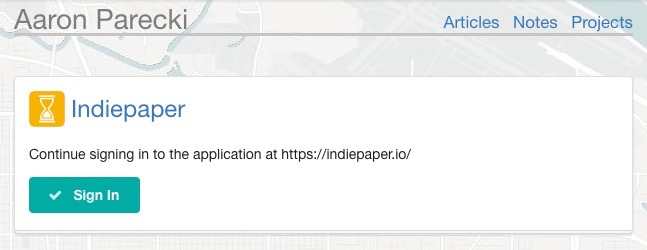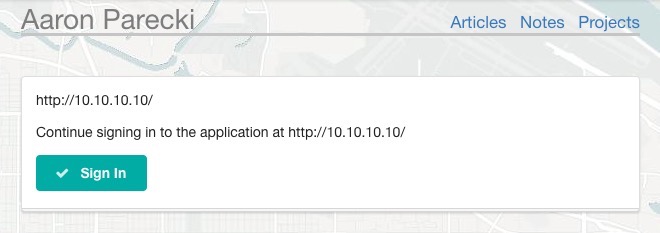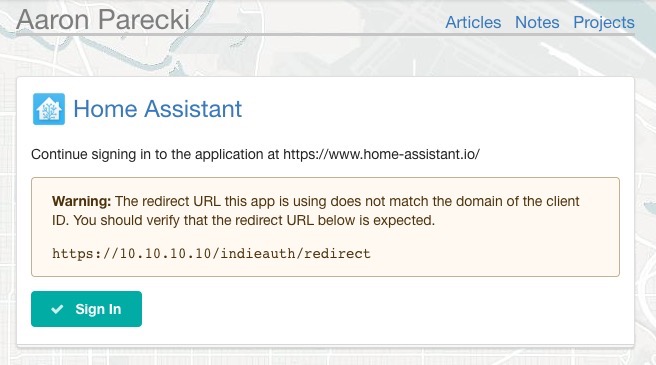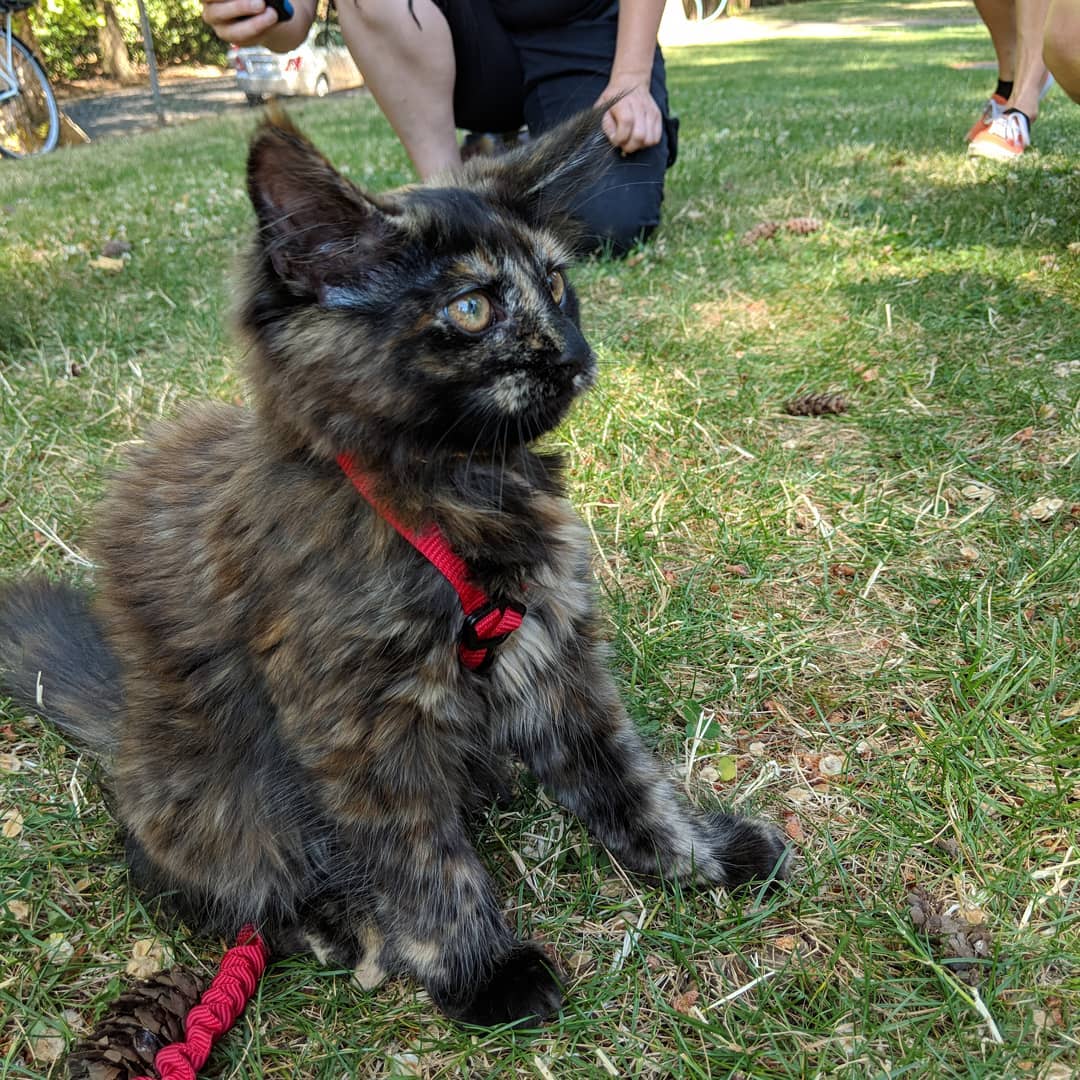-
• Jul 10And the end of explaining this to me. I’ll give you a Mattlcoin which is just me promising you dinner and beers in Boston.
-
 coolaj86
https://github.com/coolaj86
•
Jul 10
coolaj86
https://github.com/coolaj86
•
Jul 10
@aaronpk Perhaps I misunderstood and need to read carefully. Perusing https://indieauth.com/ what I got was "This is a reboot of OpenID that requires you to create a webpage and link to it".
Perhaps that's not at all related to "IndieAuth" that we're talking about here (I didn't read your article yet, but I will now).
Yeah sorry for the confusion. I've started the (very slow) process of shutting down
indieauth.combecause I never should have launched a service with the same name as the spec. That site is not a good representation of the concepts behind IndieAuth.Please do check out the blog post, it does a much better job of explaining the actual goals and motivations of the spec.
Portland, Oregon, USA • 73°F -
 coolaj86
https://github.com/coolaj86
•
Jul 10
coolaj86
https://github.com/coolaj86
•
Jul 10
@jhabdas I wouldn't.
Total tangent, but here goes...
All Authentication Sucks
For years I've been working on a protocol I call OAuth3 (but I'd like to come up with a better name). It's like a peer version of OIDC or a convenient version of IndieAuth.
However, there have been a number of roadblocks and challenges. Having something work peer-to-peer (decentralized) and be convenient, is neigh unto impossible (but it is possible).
The problem with all existing auth solutions is that they're in one of two camps: Proprietary/Centralized (OAuth2 implementations) or complicated for a non-technical user OpenID/IndieAuth.
What Could Succeed
The way I believe that peer authentication will succeed is by providing a solution that primarily executes on the client device (keypair authentication) but, by default, syncs the public keys to a shared server (with a centralized well-known server as the default), and uses a static page (or 3rd party app if on a phone) - no server APIs required to function - in essentially the way a browser plugin (or native Facebook/Google OAuth on phones) works to manage the exchanges.
Ultimately, browsers need to adopt such a protocol, but it most be open and compatible between browsers. The same is true for smart phones. Until then, the centralized server would serve as a "broker" to serve the user's preferences to other client-side apps.
Most importantly, people need to be able to login like they're used to. It must be easier than the current solutions, not more difficult (and how better to make it easier than by removing the most frustrating - and least secure - part of login: passwords).
What it might look like
First Login on a Device
- I click "Login"
- A pop-up to "generic-auth.org" opens up (better branding, but you get the idea)
- The user types in their email address (or domain name)
- The part after the '@' (if email) is checked for a
/.well-known/peer-auth/index.json- on 200 OK, redirect to that with
?subject={email}for the next step and save the user's choice - on 404 continue using generic-auth.org
- on 200 OK, redirect to that with
- I get a push notification on my device (or an email with a "magic link")
- also, generic-auth.org could link to facebook, twitter, google, etc (though a true peer-auth site could not as that would require having a developer account)
- I click the link in email (or the "Allow" option on the push notification) and I'm logged in (or, if using 2FA), I put in a passphrase or totp code
- I accept any grants (email address, photo access, etc) as needed
- I'm now logged in
- The static app on generic-auth.com (or my custom auth site) caches that this site is allowed login
Secondary Login on Device
- Behind the scenes the app loads a hidden iframe or postmessage to generic-auth.org
- The app is either told to use generic-auth.org, or the peer auth the user supplied before
- The app is given a pseudonymous pairwise identifier and short-expiry token without any interaction
- The user is simply "logged in" with 0 interaction
- The app silently renews the token (completely client-side, no server implementation), as needed
- If necessary, a grants dialog appears asking for my email address, photo access, etc
Logout
- When the user clicks "log out" in any web app (or app) that is passed via iframe or postmessage to the client-side and all private keys are deleted.
- This means that client-side tokens cannot be renewed (as they were securely generated with client-side private keys)
- Likewise an iframe or postmessage is opened for each of the list of sites which have been granted a token, causing their short-lived tokens to expire immediatley
- The generic-auth.org server (or the peer auth server) are notified that they may remove "Chrome on Jon's Macbook Pro" (or whatever) and its public keys from the list of authenticated devices.
Security
- No cookies, only tokens
- Client-side token generation
- Short-lived tokens
- Optional (but default) sync of public tokens and of grants per app/site
- Only Facebook has a properly secure login that could feasibly be used on its own as-is
- Twitter, Google, etc do not support PPIDs and are therefore insecure by default and cannot provide any information that could be used for encryption, etc, as all of the ids are shared among all apps/sites
But That's not a PERFECT Solution!
If you're on one side of a chasm and you want to migrate a host of people to the other side, you need a bridge. Something like generic-auth.org (in the hypothetical scenario above) acts as that bridge. The migration would be complete when browsers and phones natively support open-protocol peer-based authentication that doesn't require 3rd party apps to bridge the gap anymore.
Until that time you have the problem of OpenID/IndieAuth if you go for the "Perfect" peer solution - it requires too much knowledge and effort to intentionally use it. My mom is unlikely to create a website and link it to her other accounts with HTML tags.
The truly "perfect" solution then is the solution that people who don't care about technology and who don't understand the risks with their current login and authentication setups will adopt out of convenience, and perhaps a sense of individuality or pride, but certainly not for being the most technically correct solution.
The Catch-22
Peer-to-Peer can either be convenient for end-users or convenient to develop. It simply can't be both.
The saving grace is that if it's implemented in JavaScript and used in native apps through a web view, we only need a single implementation for the client-side and only 3 to 5 APIs for the server side (sync public keys, send email / push notifications, sync pairwise grants) - none of which require knowing anything about security or keypair signing and encryption - just opaque files, simple messages, and plain-old JSON.
You've basically described IndieAuth, but using
.well-knowninstead of a follow-your-nose approach.Email addresses are URLs too. If you assume an
http://scheme for an email address, fetchinghttp://aaron@parecki.com/provides the server withaaronas the username. Try it out:curl -i http://aaron@parecki.com/I made that site send an HTTP redirect to my actual website, so I can log in with my email address anywhere that uses IndieAuth right now.
Supporting two-factor auth, or passwordless auth is entirely up to the IndieAuth server, as it's not part of the federation spec. In fact, I already have passwordless login to my website using a push notification to my phone which works with every IndieAuth client already because the clients don't care how I authenticate to my website, just that I do authenticate.
As for your point about the bridge, anyone can create a generic IndieAuth provider that provides identities to anyone who wants one and doesn't care about owning their identity. They enter
generic.co/user1as their URL when they sign in. It's up to that service to make actually authenticating users as easy as possible, whether that's by emailing a one-time link, setting up a mobile app for push notifications, using a regular password, or whatever.Portland, Oregon, USA • 72°F -
I could see extending the limitation of the loopback address to also include the private IP ranges. I assume in that case it is extremely unlikely that the server will have an https certificate, so that's another reason to keep the limitation on the private IP ranges rather than allowing arbitrary IP addresses.
One of the benefits of the client ID being a publicly accessible web page is that the authorization server can fetch the application name and icon from that page.

In the case of using a private IP address, the authorization server won't be able to fetch any information about the client, so the prompt will show just the IP.

The other option is to use
https://www.home-assistant.io/as the client ID, allowing just the redirect URL to be a private IP. This breaks the rule of the client ID and redirect URL hostnames matching, so servers may show a warning like the below, but at least the application info is visible. Portland, Oregon, USA • 59°F
Portland, Oregon, USA • 59°F -
 Michael Bishop
https://miklb.com
•
Jul 8
Michael Bishop
https://miklb.com
•
Jul 8
My greatest lifehack has probably been removing the laptop charger from near the couch.
-
 amit
https://micro.blog/amit
•
Jul 8
amit
https://micro.blog/amit
•
Jul 8
@aaronpk I agree, you get to read multiple perspective on a topic. Of course, they are comments on web; so have to sort through some terrible ones. But I find the overall balance is on manageable side.
-
 always coming home
https://cybre.space/@nightpool
•
Jul 8
always coming home
https://cybre.space/@nightpool
•
Jul 8
@aaronpk yeah. this was judged this least-complicated of all the possible options
-
Here's a post I just wrote explaining IndieAuth and how it solves a number of the challenges with OAuth in this context.
https://aaronparecki.com/2018/07/07/7/oauth-for-the-open-webPortland, Oregon • 71°F -
 Syl and Miku
https://www.instagram.com/sylandmiku
•
Jul 7
One of the only pictures we took from #firstcaturdaypdx. We got way too distracted by all the cute cats!
Syl and Miku
https://www.instagram.com/sylandmiku
•
Jul 7
One of the only pictures we took from #firstcaturdaypdx. We got way too distracted by all the cute cats!
We loved seeing @roarpdx there! Miku and Syl love their new #catdancer
#mikucat #caturday #cats #catsofinstagram #adventurecatintraining
-
Include timezone offset in machine-readable timestamp
Toots are displayed in (someone's) local time, but the machine readable date is always rendered in UTC.continue reading... -
-
 always coming home
https://cybre.space/@nightpool
•
Jul 8
always coming home
https://cybre.space/@nightpool
•
Jul 8
@aaronpk oh, weird. I haven't ever seen that emoji before, that was mainly why i was confused
-
 always coming home
https://cybre.space/@nightpool
•
Jul 8
always coming home
https://cybre.space/@nightpool
•
Jul 8
@aaronpk really enjoying the custom emoji, thanks
-
 Andy McIlwain
https://andymci.com
•
Jul 7
An independent web doesn't necessarily mean an open web. Thinking about private sites and networks for groups, families, personal use. #indieweb #justathoughtAgreed, and an open web doesn't imply a public web. We're experimenting with private content too! https://indieweb.org/private_postsPortland, Oregon • 77°F
Andy McIlwain
https://andymci.com
•
Jul 7
An independent web doesn't necessarily mean an open web. Thinking about private sites and networks for groups, families, personal use. #indieweb #justathoughtAgreed, and an open web doesn't imply a public web. We're experimenting with private content too! https://indieweb.org/private_postsPortland, Oregon • 77°F -
 Julien Deswaef
https://mastodon.social/@xuv
•
Jul 7
Julien Deswaef
https://mastodon.social/@xuv
•
Jul 7
@aaronpk PS: I should mention that I started following you from the other instance. But still could not see your post before searching for it.
-
 Julien Deswaef
https://mastodon.social/@xuv
•
Jul 7
Julien Deswaef
https://mastodon.social/@xuv
•
Jul 7
@aaronpk yes. Exactly tried that. It does not work. Also, I can't seem to see the boost I did from a different instance looking at this account.
-
 Julien Deswaef
https://mastodon.social/@xuv
•
Jul 7
Julien Deswaef
https://mastodon.social/@xuv
•
Jul 7
@aaronpk for some reason, this post does not federate well with all Mastodon instances. I'm trying to boost it from another account elsewhere, but I can't seem to see it. Any clue?
-
 Julien Deswaef
https://mastodon.social/@xuv
•
Jul 7
Julien Deswaef
https://mastodon.social/@xuv
•
Jul 7
@aaronpk for some reason, this post does not federate well with all Mastodon instances. I'm trying to boost it from another account elsewhere, but I can't seem to see it. Any clue?
Portland, Oregon • 74°F

